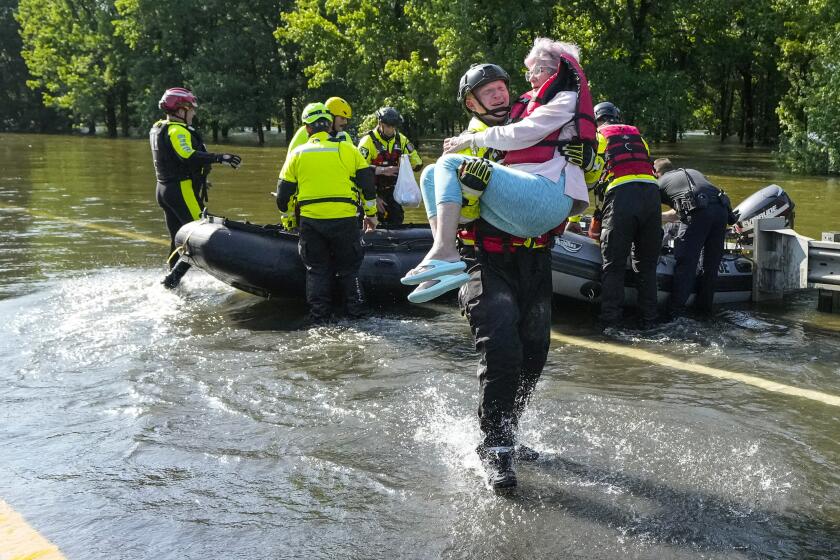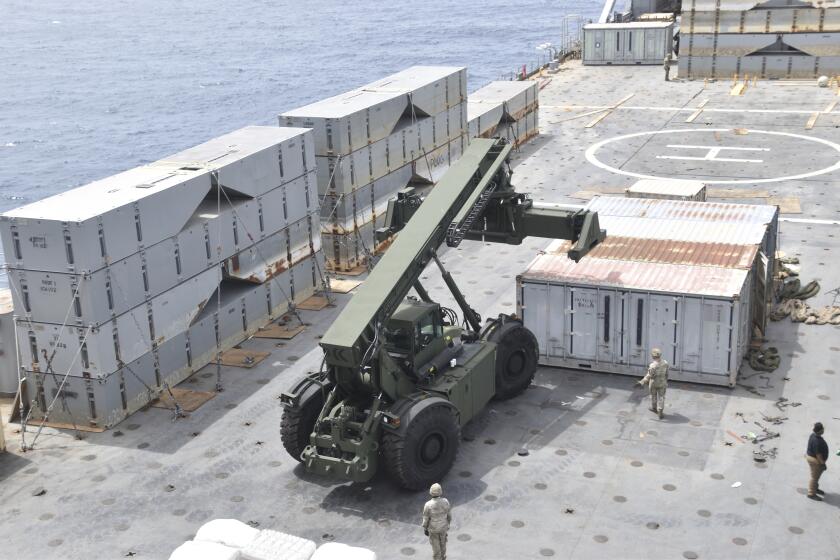Military Independence Is Still a Goal for W. Europe : U.S. backs nations’ efforts to boost defense after discouraging them during Cold War. But disagreement, lack of financing indicate pace will be slow.
With initial help from the United States, the nations of Western Europe emerged from the ashes of World War II, blossoming into stable democracies and a major global economic force.
Today, the region’s economy is one-third larger than that of the United States, and the majority of its citizens enjoy a level of personal well-being in the form of medical, educational and social benefits that far exceeds that of Americans.
Yet, for all this success, Western Europe remains America’s stepchild in one crucial field: defense.
“The reality is that Europe cannot mount a large military operation on its own without American support,” said Jonathan Eyal, director of studies at the Royal United Services Institute in London.
But after half a century of dependence, Europe has finally begun to try--pushed by the hard realities of a post-Cold War era that includes a reduced U.S. role, the trauma of Bosnia-Herzegovina and the prospect of more brush-fire wars.
Europe has also been nudged forward by the United States, which for years discouraged the idea of greater West European military independence, fearing that it could erode Western unity against communism.
Initial signs indicate, however, that there is little agreement on the way forward.
Some nations, such as Germany, envision a centrally organized and highly integrated European military force in which the influence of individual member states is blurred. Others want little part of such a scenario.
For Bonn, the future lies in units like the Strasbourg-based Eurocorps, an integrated force of 50,000 French, German, Belgian and Spanish troops now under German command. While the military effectiveness of the Eurocorps has yet to be tested, its symbolic value is indisputable, both as an example of deepening cooperation and of reconciliation among former enemies.
Last July, German tanks attached to the Eurocorps even lumbered down the Champs Elysees in Paris as part of a Bastille Day celebration.
*
Earlier this month, two new such multinational forces were established under a single headquarters command by Italy, Spain, France and Portugal to boost Western Europe’s Mediterranean flank against the threat of new instability in North Africa.
Others want little part of such moves. British Defense Secretary Malcolm Rifkind, for example, has repeatedly stressed that his country’s military forces will operate only under national control.
The first real test for these conflicting views is likely to come next year at an intergovernmental conference of the 15 European Union member states. The issue of building a common European defense policy is already on the agenda.
Preliminary discussions for that conference center on how to breathe new life into the chosen vehicle for this new defense identity, the long-dormant Western European Union. A 40-year-old organization of 10 European states that existed as little more than an empty shell until the Cold War’s end, it has since enjoyed a modest revival.
But even proponents of centralizing Europe’s defense believe the conference is unlikely to produce major change.
“I have a personal view that [the conference] has been called too early,” noted Geoffrey Finsberg, vice president of the WEU’s political committee. “I don’t think it will result in a monolithic defense structure.”
Besides sharp differences over how to move forward, other problems also block the way. Among them:
* Transatlantic differences simmer over how to implement a Clinton Administration initiative that would allow Europeans to borrow U.S. equipment, such as long-range transport aircraft, for regional crises in which the United States is not directly involved. Europeans want guaranteed access to such support, while the United States insists on veto power.
* Germany’s ability to play a full role in any new European defense group remains uncertain. To be sure, there is a growing awareness that any repeat of the 1991 Persian Gulf War, in which Germany sat at home alone while the rest of Western Europe went to fight, would be disastrous for the country.
“We’ve got to accept our responsibility,” German legislator and foreign policy specialist Karl Lamers said in a recent interview. “Our ability to keep our freedom, our prosperity depends far more on the Germans than we realize.”
*
Despite such sentiments and an easing of constitutional restrictions on the use of German forces, there is little enthusiasm in Germany for military involvement of any kind.
The gradual disintegration of the centrist Free Democrats and the prospect that the environmentalist Greens might emerge as the new holders of the balance of national power will only enhance this reluctance. In addition to their ecological hard line, the Greens are pacifists and, as a party, committed to Germany’s withdrawal from the North Atlantic Treaty Organization.
* Financing a new defense capability is certain to be problematic at a time when European governments are under intense pressure to divert resources to combat unemployment and keep increasingly indebted social-welfare programs afloat.
Indeed, as discussions go forward about building a more independent European defense arm, military spending in most West European countries, as well as for the region as a whole, continues to decline.
Eyal estimates that a serious commitment to create an independent military identity would cost European governments collectively an additional $100 billion annually over the next decade.
“This won’t happen, because the money simply isn’t there,” he said.
*
Still, some remain optimistic.
WEU Secretary General Jose Cutileiro believes that agreement is possible “by the end of the year” on a plan that would permit Europeans to “borrow” NATO assets for regional crises, and that such an accord would strengthen both the transatlantic relationship and Europe’s military capabilities.
He even takes heart from one aspect of the war in the former Yugoslav federation, a war that has sapped European self-confidence during four years of horror and a series of futile attempts to impose diplomatic solutions.
“Europe may not be strong enough to stop it,” he said. “But the crisis has proven Europeans have at least grown strong enough not to let themselves get torn apart by these events.”
(BEGIN TEXT OF INFOBOX / INFOGRAPHIC)
NATO Defense Expenditures
Figures, in constant 1993 dollars, show the decline in defense spending by NATO members.
(in billions)
1985 1992 1993 1994 Belgium 5.409 4.009 3.805 3.843 Britain 41.891 37.800 35.100 33.452 Denmark 2.747 2.722 2.700 2.667 France 42.918 43.868 42.898 43.197 Germany 46.330 42.270 36.654 34.848 Greece 3.060 4.3283 4.074 4.224 Iceland 0 0 0 0 Italy 22.576 24.986 24.400 20.632 Luxembourg 0.083 0.124 0.117 0.120 Netherlands 7.814 8.495 7.070 6.901 Norway 2.719 3.919 3.320 3.338 Portugal 1.610 2.470 2.360 2.221 Spain 9.900 9.850 7.870 7.416 Turkey 3.016 6.300 7.073 7.073 Canada 10.284 10.838 10.267 9.242 U.S. 339.229 312.960 297.300 278.730 Total 539.587 514.939 485.008 457.903
Note: Some columns may not add up due to rounding Source: International Institute of Strategic Studies in London
More to Read
Start your day right
Sign up for Essential California for news, features and recommendations from the L.A. Times and beyond in your inbox six days a week.
You may occasionally receive promotional content from the Los Angeles Times.






